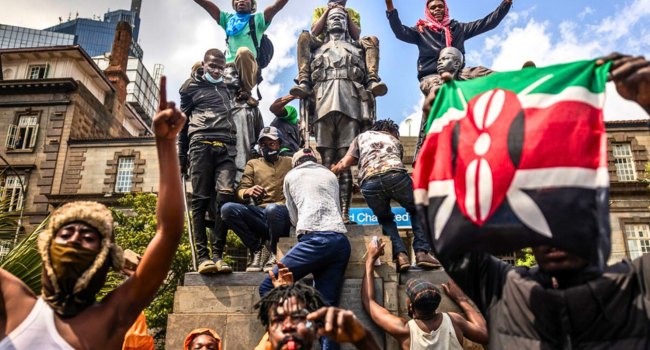Two people have died and hundreds have been injured as protests marking the anniversary of last year’s violent events turned chaotic in Kenya.
During the demonstrations, protesters clashed with police, who responded by deploying tear gas throughout Nairobi, leading to the fatalities and numerous injuries.
Protesters also barricaded government buildings with barbed wire.
The unrest coincided with marches commemorating a year since security forces killed at least 60 individuals during protests against tax increases and the worsening economic conditions facing young Kenyans.
The situation escalated dramatically when a large crowd stormed the parliament on June 25 of the previous year.
On Wednesday, thousands gathered in central Nairobi and other towns, including families of last year’s victims, for what began as peaceful anniversary marches.
However, the situation quickly deteriorated as some protesters began to throw stones at security forces.
In Matuu, approximately 100 kilometers from Nairobi, two individuals were reported shot and killed, with local media alleging that police opened fire on demonstrators.
Emergency responders treated around 300 injured individuals in Nairobi, including 67 in critical condition, according to a spokesperson for a multi-agency response team.
By late afternoon, local news outlets reported large crowds attempting to access the business district, while police set up roadblocks to prevent them.
In response to the protests, the Kenyan government ordered television and radio stations to cease live coverage immediately.
The Communications Authority of Kenya stated that broadcasting the protests violated constitutional regulations.
Read also:
- Kenyan startup Fastagger empowers MSMEs with offline AI, transforming business across Africa
- NiDCOM calls for probe into Nigerian TikTok worker’s death in Kenya
- AU chairperson: Djibouti’s Youssouf emerges, defeats Kenya’s Odinga
This directive sparked outrage on social media, with many Kenyan media outlets continuing live coverage despite the ban.
The Standard Group, which operates various media platforms, described the government’s actions as an attempt at a “news blackout” and vowed to keep broadcasting.
They also reported that the Communications Authority had threatened to cut off signals to any media outlet that continued live broadcasts, recalling similar threats made during the protests in 2024.
Amnesty International condemned the broadcast ban, asserting that “silencing the press is not the solution.” Additionally, NetBlocks, a global internet monitoring organization, reported restrictions on the social media platform Telegram.
Public anger has intensified over police brutality, particularly following the death of a teacher in custody earlier this month.
Last week, a peaceful protest group was assaulted by a gang of motorbike-riding individuals, known locally as “goons,” who were reportedly working with the police.
Western embassies in Kenya, including those of the UK, Germany, and the US, issued a joint statement criticizing the government’s actions.






